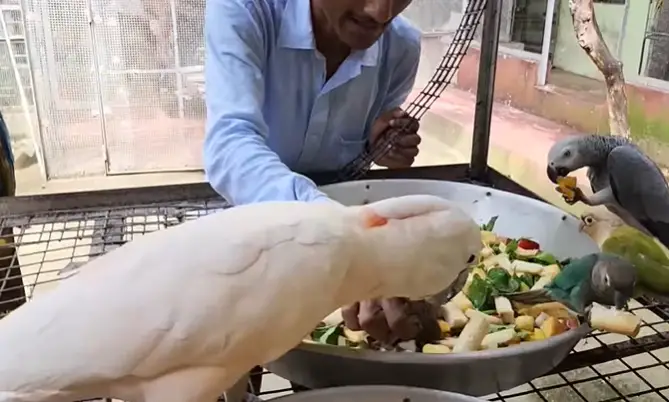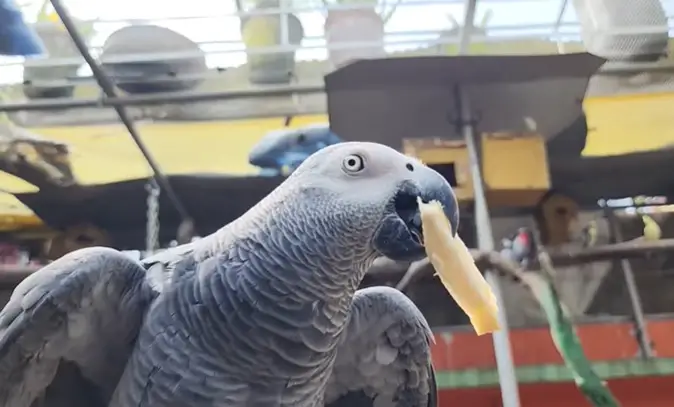Can Birds Eat Dried Coconut?
Dried coconut is a popular snack and ingredient used in various culinary preparations. If you’re a worried bird parent wondering whether dried coconut is safe for your feathered friend, we have the answer for you: birds can eat dried coconut, but it should be given in moderation and with caution.
Important Nutrient Requirements for Pet Birds
Proper nutrition is essential for the well-being of pet birds. Here’s an overview of some important nutrients, their functions, potential toxicity, and deficiency outcomes based on the daily dietary requirements for pet birds:

- Water: Fresh, clean water should be available at all times to ensure hydration and proper bodily functions.
- Carbohydrates: Birds derive energy from carbohydrates found in grains, fruits, and vegetables.
- Vitamin D: Necessary for proper development, but excessive amounts can lead to toxicity.
- Vitamin A: Critical for vision, cellular differentiation, and immune function; excess can be toxic.
- Fatty Acids: High-fat diets with low polyunsaturated fatty acids can predispose birds to atherosclerosis.
- Calcium and Phosphorus: Calcium deficiency can lead to egg binding; seeds commonly fed have low calcium and high phosphorus content.
- Zinc: Important for feather growth and egg production; deficiency leads to decreased feather growth, egg production, inflammation of the crop, and parakeratosis.
- Selenium: Important for egg fertility; deficiency can lead to muscle dystrophy and lower hatchability.
- Copper: Decreases growth, feed intake, feather intensity, and may cause soft eggshells.
- Kidney Diseases: Hypovitaminosis A, vitamin D3 toxicity, and excess dietary calcium can contribute to kidney diseases.
- Essential Amino Acids: Birds are unable to synthesize certain essential amino acids; gradual dietary changes are recommended.
- Immunity: Both deficiency and excess of dietary vitamin A can affect immune function.
Based on these requirements, it’s important to provide a well-balanced diet that meets the nutritional needs of pet birds.
Nutrient Profile of Dried Coconut
Dried coconut is a dehydrated form of the coconut fruit. Let’s take a closer look at its specific nutrient values per tablespoon, according to the USDA website:
| Nutrient | Amount per Tablespoon |
|---|---|
| Carbohydrates | 2.63g |
| Vitamin C | 0mg |
| Vitamin D | 0IU |
| Vitamin A | 0IU |
| Fatty Acids | 2.43g |
| Calcium | 1.33mg |
| Phosphorus | 8.48mg |
| Zinc | 0.06mg |
Please note that this information was collected from the USDA website (source).

Analysis of Dried Coconut’s Nutrients for Pet Birds
While dried coconut contains some carbohydrates, fatty acids, and a small amount of calcium and phosphorus, it lacks significant amounts of essential nutrients required by pet birds. Specifically, it is deficient in vitamin A, vitamin D, and zinc, which are important for vision, immune function, and feather growth, respectively. Therefore, dried coconut should not be relied upon as a primary source of nutrition for pet birds.
However, as an occasional treat, dried coconut can be given to birds in small amounts. It can provide some variety and enrichment to their diet. Ensure that the dried coconut is unsweetened and free from any additives or seasonings that may be harmful to birds. Moderation is key to prevent any digestive issues or imbalances in their overall diet.
Conclusion
In conclusion, birds can eat dried coconut, but it should be considered an occasional treat rather than a staple food in their diet. While dried coconut offers some carbohydrates, fatty acids, calcium, and phosphorus, it lacks essential nutrients like vitamin A, vitamin D, and zinc. To ensure a well-balanced diet, it is crucial to provide a variety of nutrient-rich foods that meet the specific needs of your pet bird.
FAQs (Frequently Asked Questions)
Can dried coconut be given to birds every day?
No, dried coconut should not be given to birds every day. It lacks essential nutrients and should be considered an occasional treat.
Is it safe to feed dried coconut with the husk to birds?
No, it is not safe to feed dried coconut with the husk to birds. The hard husk can pose a choking hazard and should be removed before offering dried coconut as a treat.
Can dried coconut cause digestive issues in birds?
Excessive consumption of dried coconut can lead to digestive issues such as diarrhea in birds. It’s best to offer it in small amounts and monitor your bird’s response.
What are the risks of vitamin deficiencies in birds?
Vitamin deficiencies can lead to various health issues in birds, including impaired vision, weakened immune function, and poor feather growth. Providing a balanced diet is crucial to prevent such deficiencies.
Are there any other safe alternatives to dried coconut for birds?
Yes, there are several safe alternatives to dried coconut for birds, including fresh fruits, vegetables, and specific bird treats available in pet stores. Consult with an avian veterinarian to determine the best options for your bird’s dietary needs.
Want know about other safe food for birds? Check out-
